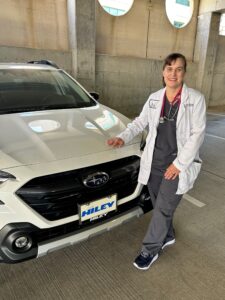HSC Health House Calls program benefits from the purchase of a new vehicle
- July 1, 2024
- By: Kimberly Rossiter
- Patient Care
Related Links

House calls are often necessary for patients who have an illness or injury that prevents them from coming into a clinic, or those with transportation challenges. The HSC Health House Calls program is a service of the HSC Health Center for Older Adults that in the last fiscal year has served more than 250 unique patients, all without having an official method of transportation. However, the recent purchase of a 2024 Subaru Outback will allow for the increased safety and efficiency of house call visits.
Before funding from The University of North Texas Health Science Center at Fort Worth made it possible to purchase the Subaru as the new dedicated car for the program, providers drove their own vehicles to residences. This presented three challenges – liability, safety and logistics.
“House calls enable us to see social determinants of health, and understand what a patient is dealing with day-to-day,” said Chief Medical Officer Dr. Janice Knebl. “A lot of times, without going into their homes, you would never know. It is a privilege to be invited into someone’s home, to better understand and care for them.”
Before, students had to drive their own vehicles or their opportunities to observe were limited. Now with the Subaru, both HSC House Call clinicians and students can ride together. Nurse Practitioner Jennifer King, who conducts house calls, says that extra time can be used for education and preparation.
“As a former student, I think riding with your preceptor is beneficial as you could discuss your visits or cases while in the car to or from the patient’s homes,” said King. “It’s important that students get to observe, because the house calls program helps identify the gaps in care for our aging population, helps with aging in place and reduces hospital visits.”
Nurse Practitioner Kate Taylor, who has been involved in the house calls program since 2019, saw a recent example of how house calls help provide whole health care to all patients. A 90-year-old patient with mild cognitive impairment suffered a recent fall, and while she said she was fine, Taylor scheduled an in-home checkup.
“With her cognitive impairment, she was not able to really describe what was going on,” said Taylor. “Incidentally, I saw swelling in her leg and a shallow open wound where the surrounding tissues were infected. If I did not make a house call to this adult, who has difficulty getting to the office, her infection would have progressed in light of her immunocompromised state. House calls allow us to deliver care to the patient and often in a time of need.”
In addition to liability for students, providers arriving in an unmarked or unfamiliar car could also present safety issues.
“Having a dedicated vehicle certainly helps brand the program, so when we go into neighborhoods people know who we are,” said Knebl. “It also helps patients to know who’s at their door, unlike coming in our own vehicles.”
Beyond liability and safety, providers needed to carry medical supplies in their vehicles. In Knebl’s case, a car with two seats could not carry team members, students and supplies. Now, the Subaru will be stocked with everything needed for house call visits.
Providers were also accumulating mileage and maintenance on their personal vehicles. Knebl recently experienced the inconvenience of using her own vehicle for house calls when returning from a visit on the east side of Fort Worth.
“I hit a pothole and my tire went flat,” said Knebl. “Luckily, I have run flat tires, and fortunately I didn’t break the rim! But now in an HSC vehicle, I don’t have to worry about something like that happening to my car. I have a two-seater, so sometimes we go to group homes and need to bring a team member with us. Now I’ll have the space and it reduces liability.”
Nurse Practitioner Susan Matthew will be the primary driver of the vehicle, as she provides care via house calls two full days a week.
“House calls provide much needed primary care to our most vulnerable in the community,” said Matthew. “When doing a house call, you are able to assess the home environment, which includes other people living in the home, pets, cleanliness, safety hazards and therefore we can initiate a plan of care tailored to their specific needs.”
The need for in-home care is evident, with programs like Meals on Wheels serving over 5,000 clients and delivering more than one million meals a year to homebound patients in Tarrant County alone.
“House calls are important, especially to our geriatric patients,” said Dr. Trisha Smith medical director for House Calls. “By seeing them in their homes, it reduces significant stress on the patients and their caregiver.”
The House Calls program at HSC is only available to established Center for Older Adults patients at this time. To make an appointment with the Center for Older Adults, please call 817-735-2200.






Social media